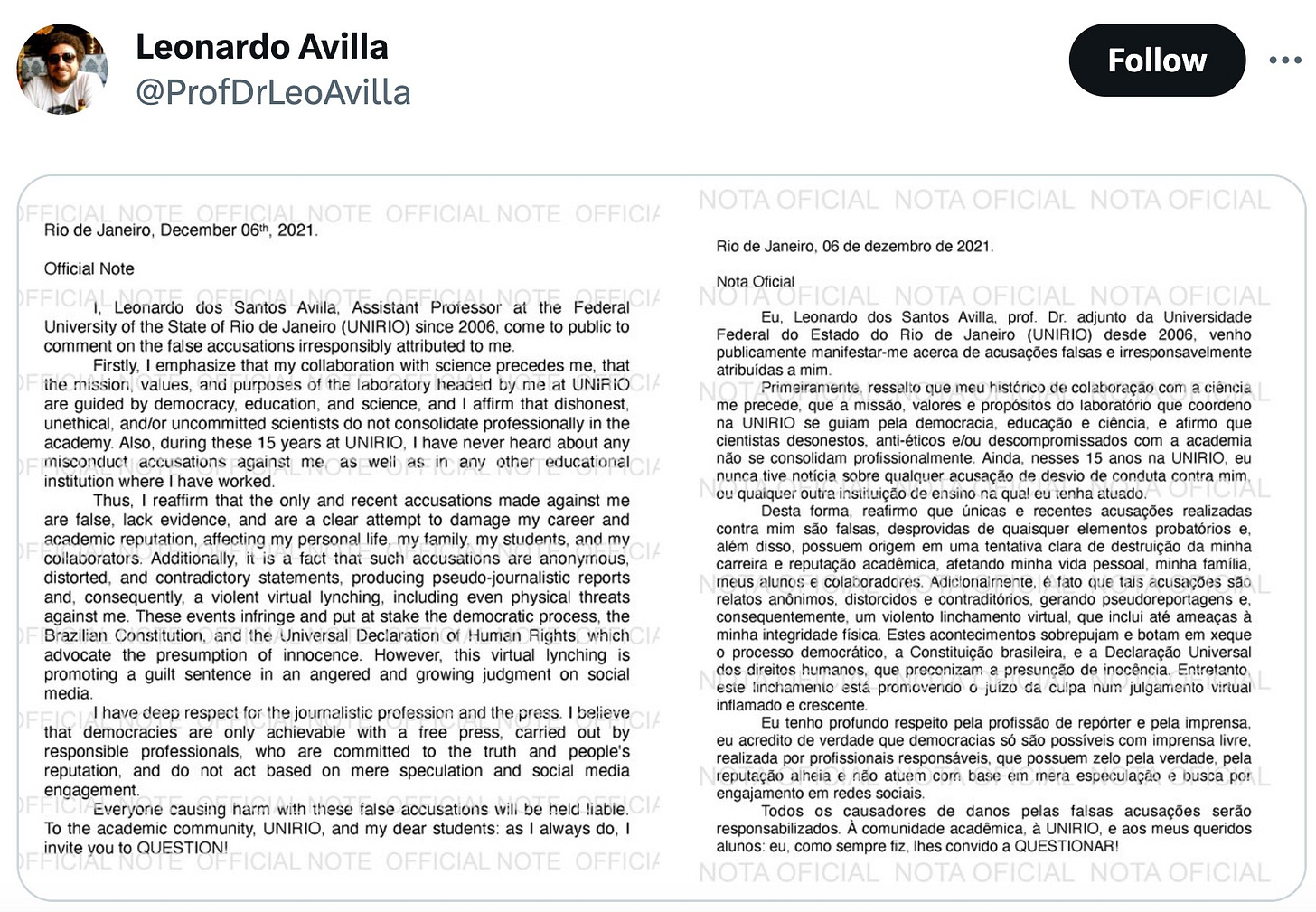Another #MeToo victory, this time in Brazil. Paleontologists and other scientists and students are celebrating.
After two years of investigation, Brazil's UNIRIO university has dismissed serial sexual predator Leonardo Avilla. A brave fight by victims and their allies did the job.
Until just a few days ago, Leonardo Avilla was a paleontologist at the Federal University of the State of Rio de Janeiro in Brazil (UNIRIO). He specialized in the evolution of mammals, and ran a lab at UNIRIO which has hosted a large number of students.
Two years ago, I was approached by Brazilian colleagues who asked me to help expose Avilla’s long history of sexual harassment, assault, bullying, and degrading of students going back more than a decade. They provided me with painful and very detailed testimonies from nine students who had either worked closely with Avilla or stopped working with him as soon as his behavior became clear.
Given the detail and obvious credibility of these first hand accounts (no rumors or second hand accounts were included in the dossier) I published a Twitter thread stating that I was investigating the matter and inviting others to contact me. In response to that thread and a couple of others, I heard from two more victims of Avilla's alleged misconduct, for a total of eleven detailed accounts.
Not long afterwards, UNIRIO suspended Avilla and announced it was beginning an investigation of the allegations. I am happy to say that late last month, UNIRIO announced that it had found the allegations supported and dismissed Avilla. Brazilian reporters for the site “Fantastico” were eventually able to interview more than 20 survivors of Avilla’s abuses (for those who do not read Portuguese, please try Google translate on the article I am linking to here.
During my own investigation (which Brazilian journalists have told me led to their own inquiries) I was struck by the similarity of the accounts, even though they occurred over a number of years and the events took place in various locations, including Avilla's home, his lab, and field sites in Brazil and elsewhere. Most of the survivors were women who had been sexually harassed in various ways. But there were also a few men who said they had been bullied by Avilla and humiliated by him.
In one case, a male student told me that Avilla had made it a condition of his staying in the lab that he would send him a nude photo of his female partner. Avilla routinely insisted that his students play a "truth or dare" game with him in which they would share intimate details of their sex lives, or in some cases disrobe to display parts of their bodies. Avilla would also insist, as part of this game, that female students kiss each other.
Avilla also told many students that he had an "open marriage," and that his wife would not mind if they had sexual relations with him. (His wife apparently knew nothing about it and has now left him.) In other cases, Avilla tried to organize sexual encounters involving more than one student. Some students, who were already well along in their studies and had nowhere else to go, gave in to these demands and suffered lasting shame and psychological harm as a result. A number of them left paleontology, a field that had been the dream of many.
In several cases, Avilla forcibly kissed female students he had gotten alone either in his house or other situations, or forced them to put their hands on his genitals. (He was always inviting students to his home, which at first they thought was a sign he wanted to help them, and sometimes carried out these assaults when his wife was in another part of the house), according to several accounts. He would also send sexual explicit photos to students as part of his efforts to entice them into sexual situations.
More than one female student who accepted Avilla's hospitality woke up in bed to find him touching their bodies and trying to remove their clothing.
Once I began publishing my reports on his abuses, Avilla began threatening victims and other witnesses with legal action, as well as more senior academics who were helping the students get justice. Remarkably, many of the students report that when they told others about their experiences, it turned out that Avilla's behavior has been known in the Brazilian paleontology community for many years.
As I have written so many times before, abuses in academia, as in any other walk of life, can be career-destroying and soul-destroying for those have been subjected to them. I can’t put it better than the words one young female paleontologist I talked to:
"I love paleontology, and we know that scientists generally follow this profession as if a dream. It saddens me how many dreams he has killed, how many incredible women Brazilian paleontology has lost."
A luta continua…





